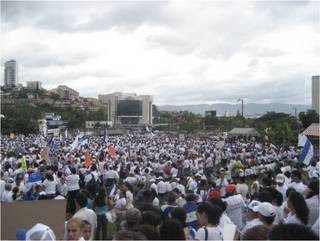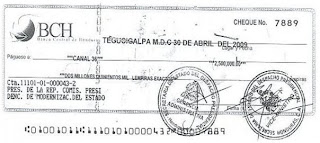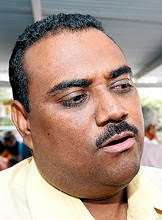
No, you did it!
Click image to enlarge.
Click image to enlarge.
I have half a dozen new articles in process but I suppose I must do the obligatory "One year later" article.
On June 28, 2009, Honduras did not have a coup d'etat.
 Honduras had a sloppy constitutional succession of power. Zelaya was flown to Costa Rica, where he probably begged to go rather than face charges for his crimes — but that was a mistake that caused the whole world (at least publicly) to assume that what had happened was a coup. They may not have dotted all 'i's' and crossed all the 't's', but this is Honduras.
Honduras had a sloppy constitutional succession of power. Zelaya was flown to Costa Rica, where he probably begged to go rather than face charges for his crimes — but that was a mistake that caused the whole world (at least publicly) to assume that what had happened was a coup. They may not have dotted all 'i's' and crossed all the 't's', but this is Honduras.There was no need to restore democracy in Honduras. Democracy was protected from a megalomaniac who was intent upon destroying it and creating another Venezuela without the oil, hoping to make himself into another Chávez in the process.
Some countries knew that. Behind the scenes, they congratulated and encouraged Honduran leaders, while cowardly saying that they could not do so publicly. The US was not one of those countries.
 The following months were a very rough time for Honduras and Hondurans, economically and emotionally, an unsettling, scary, eye-opening time, finding that the countries who they thought were friends and allies were not. Certainly no one outside of Honduras ever thought that they could stand up to the world for 7 months.
The following months were a very rough time for Honduras and Hondurans, economically and emotionally, an unsettling, scary, eye-opening time, finding that the countries who they thought were friends and allies were not. Certainly no one outside of Honduras ever thought that they could stand up to the world for 7 months.It was also a wonderful time — a time when petty political parties leanings were set aside for the greater good of Honduras. Most Hondurans tossed aside the "Si Díos quiere" (if God wills it) attitude that holds Honduras down and stood up for something. Nacionalistas, Liberales, Democratic Christian, and PINU party members stood united behind their president, Roberto Micheletti.
 It wasn't only the oligarchy or elite as some would have you believe. Taxi drivers, teachers, hairdressers, vegetable vendors, and people who literally do not have enough to eat were pounding their thighs, saying things like, "Did you see what Micheletti said to Insulza yesterday?! Viva Honduras!" Middle class people for possibly the first time were actually proud of their president and proud of their country. Micheletti's speeches would cause us to shiver and bring tears to our eyes. Finally, Honduras had a president with huevos! People began to believe that Honduras could change.
It wasn't only the oligarchy or elite as some would have you believe. Taxi drivers, teachers, hairdressers, vegetable vendors, and people who literally do not have enough to eat were pounding their thighs, saying things like, "Did you see what Micheletti said to Insulza yesterday?! Viva Honduras!" Middle class people for possibly the first time were actually proud of their president and proud of their country. Micheletti's speeches would cause us to shiver and bring tears to our eyes. Finally, Honduras had a president with huevos! People began to believe that Honduras could change. Not everyone felt that way, of course. Do 100% of the people agree on anything in any country? There was a minority who for various reasons, including socialist leanings, were for Zelaya. That number grew over time, in part because of the hate campaign designed to divide the country into the haves and have-nots, in part because of false propaganda about human rights violations from the Chávez-paid media, as well as financial incentives for unions, union leaders, and protesters. Zelaya was a very bad president and it was interesting to see that some people who only days or weeks before were ranting against him did a 180 degree turn and began to protest for him. It was hard to understand.
Not everyone felt that way, of course. Do 100% of the people agree on anything in any country? There was a minority who for various reasons, including socialist leanings, were for Zelaya. That number grew over time, in part because of the hate campaign designed to divide the country into the haves and have-nots, in part because of false propaganda about human rights violations from the Chávez-paid media, as well as financial incentives for unions, union leaders, and protesters. Zelaya was a very bad president and it was interesting to see that some people who only days or weeks before were ranting against him did a 180 degree turn and began to protest for him. It was hard to understand. But the Zelayistas/ Resistance/ Constituyentes or whatever they would like to be called were never more than 20% of the population, and probably something less than that. Many teachers and other union members were forced by their unions to strike and/or march, often against their true beliefs. They had to; their jobs depended upon it.
But the Zelayistas/ Resistance/ Constituyentes or whatever they would like to be called were never more than 20% of the population, and probably something less than that. Many teachers and other union members were forced by their unions to strike and/or march, often against their true beliefs. They had to; their jobs depended upon it.They struck and marched against Zelaya in the prior years and up until about a week before his ouster. They struck and marched against Micheletti. And they are striking and marching against Lobo now. It's hard to take people who are against everything all the time seriously, especially when the ones who suffer most from their actions are children, patients, and poor people.
Other, less educated people were somehow convinced that the constitution was the root of all evil and that somehow if the constitution was changed, they will no longer be poor. I say 'somehow' because I have yet to read a single concrete suggestion about what needs to be changed in the constitution. In my opinion, laws need to be enforced, some laws need to be changed, and the punishment for some crimes, like corruption, needs to be made more punitive, but the constitution can be changed where it needs it without destroying the separation of powers of the state. While more direct involvement by citizens in the government sounds good, remember that a large portion of Honduras' population has no more than a 6th grade education, many less than that. Understanding economics or the ramifications of decisions is beyond their grasp, and that is especially the fault of the poor educational system.
Where are we a year later? Unfortunately, we are pretty much back to business as usual. Corruption is not denounced, corruptos are not punished, crime, especially violent crime, is worse than ever. Teachers, hospital workers, and many other government workers are on strike all the time. The government is as wasteful and stuffed full of political appointees as ever despite promises of austerity. Honduras is near bankruptcy and we have a president who, by trying to please everyone, is pleasing no one.
 The US, OAS, G-16, and other countries continue to try to intervene in the internal matters of Honduras, weakening the separation of powers, with the intent of ridding Lobo's government of all who they consider golpistas, while publicly applauding the government of unity. Doesn't 'unity' imply that both sides are represented? They seem intent on assuring that impunity against corruption continues to reign supreme in Honduras.
The US, OAS, G-16, and other countries continue to try to intervene in the internal matters of Honduras, weakening the separation of powers, with the intent of ridding Lobo's government of all who they consider golpistas, while publicly applauding the government of unity. Doesn't 'unity' imply that both sides are represented? They seem intent on assuring that impunity against corruption continues to reign supreme in Honduras. Zelaya, Chávez and his ALBA eejits are still trying to do everything they can to harm Honduras, even when they look like fools trying to do it. Chávez, through Zelaya, has his machine in Honduras and they will be chinking away at democracy at every opportunity.
Zelaya, Chávez and his ALBA eejits are still trying to do everything they can to harm Honduras, even when they look like fools trying to do it. Chávez, through Zelaya, has his machine in Honduras and they will be chinking away at democracy at every opportunity.Oddly enough, both sides of the Zelaya/constitutional assembly issue would agree on most issues that are really important to the country: corruption, security (against crime), health care, education, jobs, justice, if they stopped to think about those issues instead of regurgitating divisive slogans about "constituyente" and "golpistas" and "urge Mel".




If they only thought about the leaders that they are listening to, they would know that a constituyente would only trade one group of elite for another, just as corrupt, just as greedy, and just as uncaring.

Transformemos Honduras is a civic group that is focusing on 15 key issues and trying to work with the government to make changes for the better of all Hondurans, particularly the poor. [TH website in English] I hope that sometime soon, most of those misguided people will get tired of the hate and useless protests and start working toward something constructive and positive for Honduras. I know their leaders won't, but maybe the people will.
There is still that glimmer of hope, but most on both sides are disappointed that we haven't seen many changes in the first 6 months of the "Cambia Ya!" government. (Change Now!)
And finally, the congress has still not passed an amendment to add an impeachment clause to the constitution.



 Welcome to my Blogicito —
Welcome to my Blogicito — 







